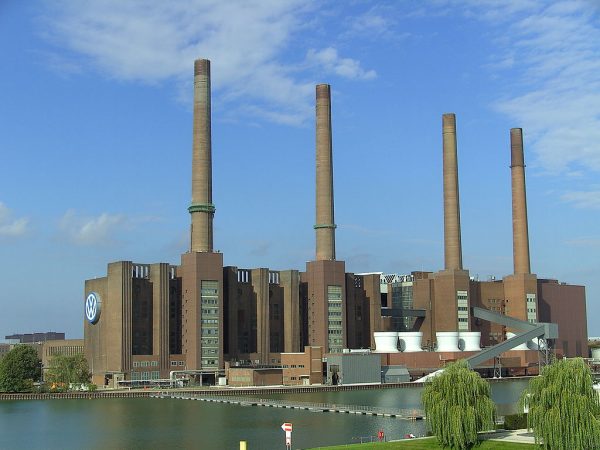
Trump, German auto executives meet at White House
by Darlene Superville, The Associated Press

The "Tariff Man" threatened to charge tariffs on auto imports from Europe and other countries, citing U.S. trade deficits with those nations

PHOTO: Volkswagen Wolfsburg industrial plant/via Wikimedia Commons
WASHINGTON – President Donald Trump and executives from Germany’s biggest automakers discussed the companies’ investments in the U.S. on Tuesday as trade tensions with the Europeans and Trump’s threat to impose tariffs on foreign cars sold in the United States loomed overhead.
Trump “shared his vision of all automakers producing in the United States and creating a more friendly business environment,” the White House said in a statement. The statement did not say whether Trump raised tariffs with executives from BMW, Daimler and Volkswagen.
Trump, however, has threatened to slap tariffs on auto imports from Europe and other countries, citing U.S. trade deficits with those nations. Trump is relying on tariffs, and the threat of imposing them, to force other countries to buy more goods from America.
“I am a Tariff Man,” the president said Tuesday in one of a series of tweets about a new round of trade talks with China after the world’s two largest economies imposed tariffs on hundreds of billions of dollars of each other’s goods after Trump struck first.
“When people or countries come in to raid the great wealth of our Nation, I want them to pay for the privilege of doing so. It will always be the best way to max out our economic power. We are right now taking in $billions in Tariffs. MAKE AMERICA RICH AGAIN.”
Automakers said the talks were productive. They included individual conversations with some of the president’s top economic advisers.
“From our perspective, the U.S. position is understandable,” VW said in a statement. “They want more investment in the U.S. Now it is up to the governments and the European Union to find a solution that benefits all parties. As Volkswagen Group, we are committed to encouraging stable trade relations between the U.S., Germany and the whole European Union.”
Daimler said the discussions were “conducted in a businesslike atmosphere and related to the respective companies and their involvement in the USA. The meeting with the president was very good and very open.”
BMW said it used the opportunity “to explain in detail the extent of its footprint in the USA” and that the “mandate to talk about international trade politics rests solely with the relevant political institutions,” the company said in a statement. German Chancellor Angela Merkel this week dismissed suggestions that the automakers could conduct trade policy, saying trade negotiations are the responsibility of the European Union.
BMW also described itself as a committed “local player” for a quarter century with a plant in Spartanburg, South Carolina, that employs nearly 10,000 people. The company said it will invest $600 million in manufacturing through 2021, creating an additional 1,000 jobs in Spartanburg.
Trump has threatened to tax imported cars, trucks and auto parts, potentially targeting imports that last year totalled $335 billion, and the European Union had warned that it would retaliate with tariffs on products worth $20 billion if Trump put duties on cars and auto parts from Europe.
But Trump and European leaders stepped back from the brink of a trade war over autos during the summer, agreeing to open talks to tear down trade barriers between the United States and the EU.
Commerce Secretary Wilbur Ross, U.S. Trade Representative Robert Lighthizer, chief economic adviser Larry Kudlow and other administration officials met individually with executives from each of the automakers.
The meetings follow the announcement last week by General Motors that it will cut up to 14,000 workers in North America and put five plants up for possible closure as it restructures to focus more on autonomous and electric vehicles.
Peter Navarro, the president’s top trade adviser, expressed confidence in Trump’s trade strategy.
“What’s great about this is that they wouldn’t be coming to the table here to talk to us unless the president had auto tariffs on the table,” Navarro told Fox Business Network about the Germans.